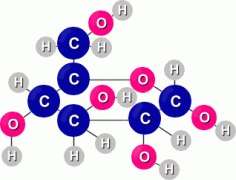What exactly are carbohydrates?
I’m not a nutritionist. Or a scientist. I did the usual science lessons at school and I also took Food Technology (that means Home Economics…) and I have a vague notion of some of the scientific building blocks involved in food although I know at one stage I learnt a reasonable amount about them. So now I’m going back to basics and revisiting some of the concepts of nutrition to refresh my own knowledge. I’m going to keep it fairly bitesize so I don’t confuse myself. If you actually know anything about nutrition, this will be way too basic for you – it’s more of a layman’s guide.
What are carbohydrates?
Carbohydrates are compounds made up of carbon, hydrogen and oxygen atoms. The atoms form chains of sugar molecules.
A sugar molecule consists of 6 carbon atoms, 12 hydrogen atoms and 6 oxygen atoms. The picture at the top of the post is a sugar molecule – glucose to be exact.
Carbohydrates can be classified as simple or complex:
Simple carbohydrates have either one sugar molecule (monosaccharides) or two sugar molecules (disaccharides).
Monosaccharides include:
- Glucose: sugar in the blood
- Fructose: found in fruit
- Galactose: found in dairy products
Disaccharides include:
- Sucrose: table sugar – the kind you buy in packets
- Lactose: found in milk
Complex carbohydrates are called polysaccharides and are made of many simple carbohydrates linked together.
Polysaccharides include:
- Starches: chains of glucose molecules, found in grains i.e plants. Starches are broken down into the individual glucose molecules during digestion. Glucose gives us energy.
- Glycogen: chains of glucose molecules, found in animals, in the liver and muscles. Glycogen chains have more branches than starch chains. We don’t really eat glycogen, as very little remains in the meat we eat.
- Fibre: chains of glucose molecules, found in plants. Fibre is not broken down into individual glucose molecules, it just passes through the body (there is more to it than that – that’s just the basics).
What happens when we eat carbohydrates?
When we eat carbohydrates, enzymes in the body convert them into the simple carbohydrates i.e. glucose, so that they can be absorbed into the blood. Carbohydrates which are simple to begin with are digested more quickly.
Glucose is used in the body; it is transported to your cells, which burn it to produce heat, and another molecule called ATP stores and releases the energy as it is required, for example for muscle contractions. Glucose not used is stored in chains, as glycogen, for use later on.



April 9th, 2012 at 16:58
Thanks for the explanation! Sadly, I’ll forget it all again in 10 minutes, but for a shiny moment there, I felt quite a bit wiser.
I’m always impressed when people can tell me the scientific reasons why stuffing my face full of pastry in the morning is NOT a good idea.
May 7th, 2012 at 09:18
[…] we have discussed previously, carbohydrates are made up of chains of glucose molecules. When we digest carbohydrates, the body […]
May 21st, 2012 at 09:04
[…] have already talked about how the body breaks down the carbohydrates we eat into glucose molecules, and as we know, glucose is a type of […]